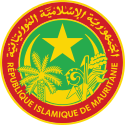| ||||||||||||||||||||||
All 70 seats in the National Assembly 36 seats needed for a majority | ||||||||||||||||||||||
|---|---|---|---|---|---|---|---|---|---|---|---|---|---|---|---|---|---|---|---|---|---|---|
| Registered | 482,305 | |||||||||||||||||||||
| Turnout | 92.82% | |||||||||||||||||||||
| ||||||||||||||||||||||
 |
|---|
|
Parliamentary elections were held in Mauritania on 9 May 1965. Following the merger of all the country's political parties into the Mauritanian People's Party (PPM), the country had become a one-party state in December 1961. [1] As such, the PPM was the only party to contest the election, and won all 40 seats in the National Assembly. Voter turnout was 93%. [2]
